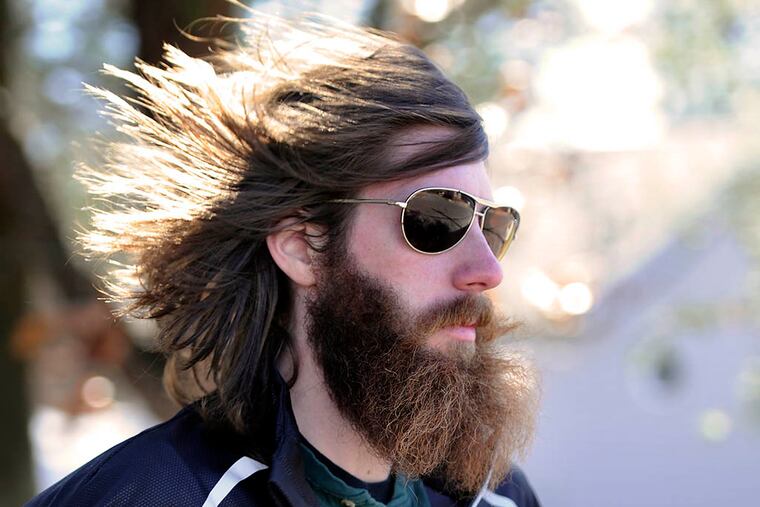COOL RUNNINGS
If you want to complete a marathon run through the hilly, icy, and remote end of the Earth - and win the annual race in Antarctica - just train outdoors, in the bitter of winter, in West Deptford.

If you want to complete a marathon run through the hilly, icy, and remote end of the Earth - and win the annual race in Antarctica - just train outdoors, in the bitter of winter, in West Deptford.
It worked for Andrew Morris.
"I was just running out in that and hoping for the best," Morris, 27, said Wednesday, one day after returning to his home near the Delaware River in the Gloucester County town.
Morris took the top honor at the 16th Antarctica Marathon this month at King George Island. The unique race, first held in 1995, attracts adventure-prone runners from around the world looking for a new challenge.
But Morris couldn't think of any special preparation that allowed him to beat the times of 135 others - finishing in three hours, 27 minutes, and two seconds.
"One foot in front of the other until they said it was time to stop," Morris said of his first marathon victory.
The 26.2-mile race and a half-marathon were held on two days - March 9 and 10 - because of environmental restrictions in Antarctica that limit to 100 the number of visitors who can be at one landing area at a time.
"Andrew ran a very aggressive race, and he was the strongest runner on either day," said Thom Gilligan, president of the Boston-based Marathon Tours & Travel, which hosts the race.
Participants in the two competitions this year hailed from 22 countries and ranged in age from their early 20s to their early 70s. There are waiting lists for 2016 and 2017.
On the second day of this year's race, when Morris ran, the temperature was about freezing. Winds whipped at about 32 m.p.h.
Morris wore his typical running gear: compression tights, gloves, a hat, a long-sleeved shirt, and a fleece jacket. "The kid who I was with for the first half of the race, he ran in shorts," Morris said. "He was a badass."
Some might say the same about Morris, who in a photo taken after his victory extends his arms skyward with a finisher's medal descending from beneath his thick beard. He looks toward the camera from behind sunglasses, a snow-dusted landscape of dirt and gravel behind him.
"I don't think anything in my life has been as awesome," Morris said of the experience.
It wasn't until Morris was about a half-mile from the finish line that he unwrapped his jacket from around his waist and put it on. "It got pretty cold really quickly at the end," he said.
To train, Morris shifted his work schedule at Eagle Point Gun in West Deptford - his family's business, which sells guns and ammunition to law enforcement agencies - to make time to run.
"Rain, snow, sleet, sun, hot, cold," his father, Tom III, a lawyer and retired Marine Corps major who co-owns the company, said of the son's conditioning. "Every day."
Still, Gilligan said, the Antarctica race is no easy course. "It's very tough," Gilligan said, noting the intense travel commitment.
A 2005 graduate of West Deptford High School, Andrew Morris began running year-round while on the school's track team. While studying business at Lehigh University, he continued to run for personal pleasure.
In 2009, he was "peer-pressured" by a friend to run his first marathon, in the Lehigh Valley, he said, adding, "I just got hooked on them."
Since then, he's run marathons in Australia, Germany, and China. His goal, like that of many other marathon runners, is to compete on every continent.
The most recent journey - which included flying to Buenos Aires, Argentina, then to the tip of South America, and taking a three-day boat trip to King George Island - cost him about $10,000. When not competing, the visitors explored the bays of the island, which is home to research bases.
Tom Morris called his son's trip to Antarctica the "opportunity of a lifetime."
"It makes a great story," he added. Andrew Morris attended with a friend from college and fellow member of Sigma Phi Epsilon, Scott Kline, who ran in the half-marathon.
It's more about the experience than the race time, Morris said. "The primary purpose is not to be the fastest," he said.
Better than Morris' Antarctica time was his performance in the April 2013 Boston Marathon. He placed 1,270 (with a time of two hours and 55 minutes) before the deadly bombings shook the country.
"Confusing" was the word Morris used to describe the chaotic day. He wasn't directly near the explosions, and was able to leave the city the next morning.
On Wednesday, Morris was still reveling in what he deemed a surprising victory in Antarctica. The thought of winning "had not really crossed my mind" until about halfway through the course, he said.
By the afternoon, he had reunited with his 7-month-old dog, a German shorthaired pointer, Nema. And he had registered for another race.